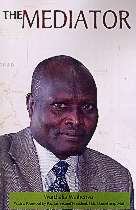S. Sudan hopes Lazarus and IGAD can resurrect north-south talks
February 14, 2013 (JUBA) – South Sudan has expressed hope that retired Kenyan general Lazarus Sambeiyo can help break the deadlock over post-secession issues between Sudan and South Sudan, as part of the East African regional body IGAD.

An IGAD delegation headed by Sambeiyo is in Juba holding a number of high-level meetings with South Sudanese officials, civil society organisations, individual activists and the United Nations.
The objective of the delegation is to gather views and ideas from a variety of groups in order to draw up a plan to see how best to help the two nations find final solutions to a host of issues related to South Sudan’s independence in 2011.
The IGAD delegation will next visit the Sudanese capital Khartoum, where Sambeiyo expects to meet and hold similar discussions with senior government officials, as well activists.
In September last year, the two sides signed deals on nine issues, including the amount South Sudan would pay Sudan in oil transit fees. However, Khartoum has insisted that border security issues be resolved before they will allow South Sudanese crude to be exported through its territory.
After meeting James Wani Igga, the speaker of South Sudan’s parliament on Wednesday, Sambeiyo said he wanted to listen carefully to the leadership and the people of South Sudan regarding the issues which the two sides have not been able to resolve amicably.
“The people of South Sudan have a fought a devastating and a long war. They have suffered a lot. They lost everything during war. Millions of lives were lost. They needed peace and they got it. I am sure they need to work so that they can rebuild their lives and enjoy peace dividends. The people of Sudan also fought for many years and I am sure they need peace”, said Sambeiyo.
Although he has met with senior officials, Sambeiyo has not yet met South Sudan’s president, Salva Kiir Mayardit, and did not say whether the leader was one of the officials he would like to meet while in the country.
The two countries came close to returning to all out war in April last year after fighting erupted over the disputed oil-producing region of Heglig, one of many areas claimed by both sides.
For his part, Igga said his country welcomes the visit and decision of the regional body to help in the mediation process to break the deadlock with the government of Sudan. He described Sambeiyo as a “true peace advocate and friend of the two nations”, acknowledging that he would need maximum cooperation from both sides in order for him to accomplish his assigned mission.
“General Sambeiyo enjoys support from both sides. He is a friend of the two nations. He played a big role in the regional peace when he patiently mediated the talks between us and the government of Sudan. There were ups and downs but he eventually managed to bring [the two sides] together. So as the government, we will welcome the initiative”, he said.
Meanwhile, South Sudan’s information minister, Barnaba Marial Benjamin, has again expressed his disappointment with the current mediation processes which is being facilitated by the African Union High-Level Implementation Panel (AUHIP) under the leadership of former South African president Thabo Mbeki.
Marial said Sudan was taking advantage of the reluctance of the international community, particularly the African Union to make a final decision on issues such as the final status of the disputed region of Abyei.
Under a peace deal mediated by Sambeiyo, residents of Abyei were scheduled to vote in January 2011 on whether to join South Sudan or remain north of the new international border, but Khartoum’s demand that the Misseriya nomads participate has indefinitely delayed the plebiscite.
The latest proposal from the AUHIP is for a referendum in October this year excluding the Misseriya and solely with residents of the area – mainly the Dinka Ngok ethnic group – who would be expected to vote to transfer Abyei to South Sudan.
“The reason the African Union Peace and Security Council came and drew up [a] tight timeframe at the height of the conflict last year was [to] break the deadlocks and to put an end [to] endless bilateral negotiations, but now continues to accept claims by Sudan to extend “negotiations”, said Marial.
“We have failed to reach [an] agreement on the issues that we accepted [as part of] their (the AUHIP) proposal. So why return us back to square one?” he asked at a news conference at the ministry of information.
The senior member of the country’s governing Sudan People’s Liberation Movement (SPLM) said the African Union’s lack of decision was testing its authority.
“Sudan is challenging [the] credibility of the African Union and the existence of the authority. What Khartoum is doing is actually a clear violation of [the] Constitutive Act which all member states must respect and this will put the legitimacy and credibility of the African Union to test as [a] continental authority”, he said
(ST)
